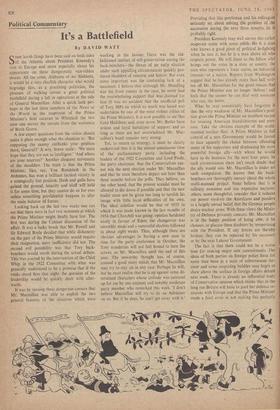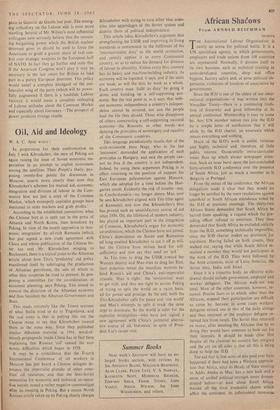Political Commentary
It's a Battlefield
By DAVID WATT somE harsh things have been said on both sides of the Atlantic about President Kennedy's visit to Europe and more especially about his appearance on these dangerously vice-ridden shores. All the same, Alabama or no Alabama, it would be a very churlish character who would begrudge him, as a practising politician, the pleasure of walking across a great political battlefield during a lull in operations at the side of General Macmillan. After a quick look per- haps at the last three numbers of the News of the World in the maproom of the Prime Minister's field caravan in Whitehall the two men can survey the terrain from the eminence of Birch Grove.
A few expert questions from the visitor should make it plain enough what the situation is: `But supposing the enemy outflanks your position there, General?' A wry, brave smile: 'We must hope that they are not so intelligent.' And where are your reserves?' Another eloquent movement of the shoulders. The truth is that the Prime Minister, like; say, Von Rundstedt in the Ardennes, has won a brilliant tactical victory in a strategically lost position. Dash and guile have gained the ground, tenacity and bluff will hold it for some time, but they cannot do so for ever unless something providential happens to alter the main balance of forces.
Looking back on the last two weeks one can see that there were in fact two moments at which the Prime Minister might finally have lost. The first was during the Cabinet discussion of the affair. It was a lucky break that Mr. Powell and Sir Edward Boyle decided that while dishonesty on the part of the Prime Minister would require their resignation, mere inefficiency did not. The second evil possibility was that Tory back- benchers would revolt during the actual debate. This was averted by the intervention of the Chief Whip in the 1922 Committee with what was generally understood to be a promise that if the ranks stood firm that night, the question of the leadership would be quickly dealt with after- wards.
It was by turning these dangerous corners that Mr. Macmillan was able to exploit the two general features of the situation which were working in his favour. There was the old- fashioned instinct of self-preservation among the back-benchers—the threat of an early election under such appalling circumstances quickly pro- duced shudders of remorse and horror. But even more important was the continuing lack of a successor. I believe that although Mr. Maudling was the front runner in the race, he never had the overwhelming support that was claimed for him (it was no accident that the unofficial poll of Tory MPs on which so much was based was undertaken by one of the most violent critics of the Prime Minister). It is now possible to see that Lord Hailsham and, even more, Mr. Butler have ardent and loyal battalions of support and so long as these are not overwhelmed Mr. Mac- millan's hand remains very strong.
Yet, to return to strategy, it must be clearly understood that it is the almost unanimous view of the parliamentary party, including the leaders of the 1922 COmmittee and Lord Poole, the party chairman, that the Conservatives can- not win the next election under Mr. Macmillan and that he must therefore depart not later than three months before the polls. They believe, on the other hand, that the present scandal must be allowed to die down if possible and that the new -leader must not be given too long to tarnish his image with little local difficulties of his own. The ideal solution would be that of 1955 in which it was made known in the last months of 1954 that Churchill was going; opinion hardened nicely in favour of Eden; the changeover was smoothly made and a successful election followed in about eight weeks. Thus, although there are obvious advantages in having a new man in time for the party conference in October, the Tory mandarins will not feel bound to turn the screws on Mr. Macmillan until the end of this year. The unworthy thought has, of course, crossed a good many minds that Mr. Macmillan may try to stay on in any case. Perhaps he will; but he must realise that he is up against some de- termined characters whose attitude was summed up for me by one eminent and notably moderate party member who remarked this week. 'I don't believe Macmillan will try to do an Adenauer on us. But if he does, he can't get away with it.' Providing that this gentleman and his colleagues seriously set about solving the problem of the succession during the next three months, he is probably right.
President Kennedy may well survey this rather desperate scene with some relish. He is a man who knows a good piece of political in-fighting' when he sees it, but he is a man above all who respects power. He will listen to the fellow who brings out the votes in a state or county, the man who represents a trade union, an industrial interest—or a nation. Reports from Washington suggest that he has already more than half writ- ten off Mr. Macmillan for the good reason that the Prime Minister can no longer 'deliver,' and feels that the sooner he can deal with someone who can, the better.
What he may conceivably have forgotten is that the very weakness of Mr. Macmillan's posi- tion gives the Prime Minister an excellent excuse for resisting American blandishments and pres- sure. Take the obvious example of the multi- manned nuclear fleet. A Prime Minister in full control of a new Government would be forced to face squarely the choice between offending many of his supporters and displeasing his most powerful foreign ally—with whom he would have to do business for the next four yearS. In such circumstances there isn't much doubt that the ally would win. Mr. Macmillan is under no such compulsion. He knows that his back- benchers are thoroughly uneasy about the whole multi-manned project. Some believe that it is military nonsense and too expensive anyhow; others, more thoughtful, consider that it reduces our power vis-a-vis the Americans and panders to a largely unreal belief that the German people desire nuclear arms. With these views the Minis- try of Defence privately concurs. Mr. Macmillan is in the happy position of being able, if he chooses, to placate these doubters by temporising with the President. If any ,fences are thereby broken, they can be repaired by his successor or by the next Labour Government.
The fact is that there could not be a worse time for making major new commitments. The ideas of both parties on foreign policy have for some time been in a state of subterranean fer- ment and some surprising bubbles may begin to show above the surface in foreign affairs debate next week. There is already an influential body of Conservative opinion which thinks that in the long run Britain will have to pool her defence re- sources with Europe and that the Prime Minister made a fatal error in not making this perfectly
plain to General de Gaulle last year. The emerg- ing orthodoxy on the Labour side is even more startling. Several of Mr. Wilson's most influential colleagues now seriously believe that the remain- ing bargaining power which the British nuclear deterrent gives us should be used to force the Americans to grant a greater share of real con- trol over strategic weapons to the European half of NATO. In fact they go further and state that if the American Congress won't play it may be necessary in the last resort for Britain to take part in a purely European deterrent. This policy would entail a complete disregard of the uni- lateralist wing of the party (which will be power- fully augmented if there is a landslide Labour victory); it would mean a complete reshaping of Labour attitudes about the Common Market and especially about Germany.—The prospect of power produces strange results.































 Previous page
Previous page